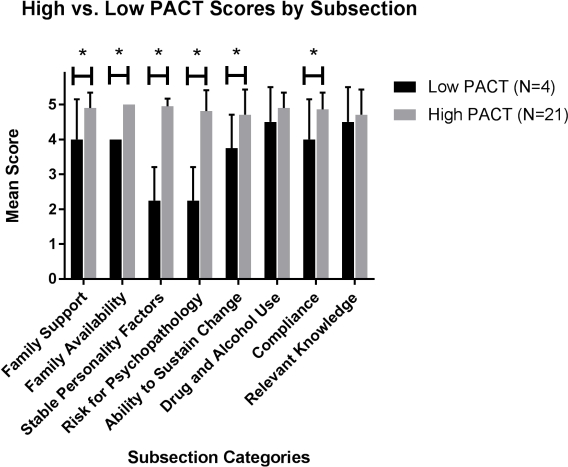Psychosocial Assessment of Candidates for Transplantation (PACT) Identifies Non-Adherence in Pediatric Kidney Transplantation
K. Freischlag,1 V. Chen,2 S. Nagaraj,2 A. Chua,2 E. Chambers.2
1School of Medicine, Duke University, Durham, NC
2Pediatrics, Duke University, Durham, NC.
Meeting: 2018 American Transplant Congress
Abstract number: C51
Keywords: Kidney transplantation, Pediatric, Psychosocial, Screening
Session Information
Session Name: Poster Session C: Kidney Donor Selection / Management Issues
Session Type: Poster Session
Date: Monday, June 4, 2018
Session Time: 6:00pm-7:00pm
 Presentation Time: 6:00pm-7:00pm
Presentation Time: 6:00pm-7:00pm
Location: Hall 4EF
Background: We have demonstrated that overall pre-transplant Psychosocial Assessment of Candidates for Transplantation (PACT) scores can identify high risk pediatric kidney recipients. In this pilot study, we examined PACT subcategories to identify patients at risk for medication non-adherence.
Methods: <21 year-old renal transplant recipients at our institution who underwent psychosocial evaluation using PACT between 2005 and 2017 were selected. PACT assesses overall candidate suitability from 0 (worst) to 4 (best) using subcategories ranked 0 (worst) to 5 (best). Patients were compared between high overall PACT score (≥3) vs. low PACT score (<3). The relationship between PACT subcategories and non-adherence was determined.
Results: Of 25 pediatric patients with a PACT score, 4 (16%) had a low PACT score and 21 (84%) had a high PACT score. Low PACT recipients had significantly lower scores in PACT subcategories of family support, family availability, stable personality factors, risk for psychopathology, ability to sustain change, and compliance (Figure 1). Physician-assessed non-adherence was associated with poor score in family availability (OR 0.08, 95% CI 0.01-0.97, p=0.047) and risk for psychopathology (OR 0.34, 95% CI 0.13-0.87, p=0.025) (Table 1).
Conclusions: In this pilot study, inferior scores in the PACT subcategories of family availability and risk for psychopathology were associated with higher rates of physician-assessed non-adherence.
Figure 1.
Table 1. Odds Ratios for Physician-assessed Non-adherence
| Variable | Odds Ratio | 95% Confidence Interval | p-value |
| Family Support | 0.38 | 0.11-1.41 | 0.15 |
| Family Availability | 0.08 | 0.01-0.97 | 0.047 |
| Personality Factors | 0.37 | 0.13-1.03 | 0.056 |
| Risk for Psychopathology | 0.34 | 0.13-0.87 | 0.025 |
| Ability to Sustain Change | 1.03 | 0.34-3.06 | 0.97 |
| Compliance | 0.44 | 0.13-1.53 | 0.2 |
| Relevant Knowledge | 1.1 | 0.32-3.74 | 0.88 |
CITATION INFORMATION: Freischlag K., Chen V., Nagaraj S., Chua A., Chambers E. Psychosocial Assessment of Candidates for Transplantation (PACT) Identifies Non-Adherence in Pediatric Kidney Transplantation Am J Transplant. 2017;17 (suppl 3).
To cite this abstract in AMA style:
Freischlag K, Chen V, Nagaraj S, Chua A, Chambers E. Psychosocial Assessment of Candidates for Transplantation (PACT) Identifies Non-Adherence in Pediatric Kidney Transplantation [abstract]. https://atcmeetingabstracts.com/abstract/psychosocial-assessment-of-candidates-for-transplantation-pact-identifies-non-adherence-in-pediatric-kidney-transplantation/. Accessed February 22, 2026.« Back to 2018 American Transplant Congress

